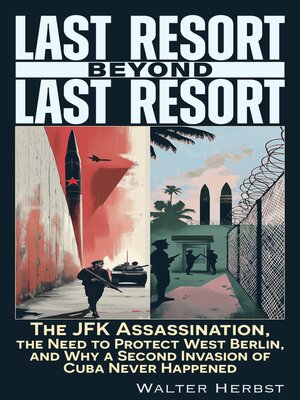Last Resort Beyond Last Resort
ebook ∣ The JFK Assassination, The Need to Protect West Berlin, and Why a Second Invasion of Cuba Never Happened
By Walter Herbst

Sign up to save your library
With an OverDrive account, you can save your favorite libraries for at-a-glance information about availability. Find out more about OverDrive accounts.
Find this title in Libby, the library reading app by OverDrive.



Search for a digital library with this title
Title found at these libraries:
| Library Name | Distance |
|---|---|
| Loading... |
John F. Kennedy was an embattled president. He was consistently at odds with the Joint Chiefs, the CIA, the radical-right, and Fascist groups in America and Western Europe, who considered him too weak to contain the spread of communism. After the Cuban Missile Crisis, the animosity for the young President grew as JFK cracked down on right-wing Cuban exile groups in America by preventing them from running sabotage raids against the Cuban mainland. Confusion reigned, for at the same time, Robert Kennedy was putting together a coalition of left-wing Cuban exiles to launch a second invasion of Cuba at the end of 1963.
Meanwhile, a right-wing Cuban exile group operating independently of the Kennedys was looking to assassinate JFK, which they believed would be a catalyst to compel the United States to invade Cuba with its military in retaliation. The plan could have worked because of Lee Harvey Oswald. He was a Marxist and Castro supporter who had defected to the Soviet Union in 1959, had renounced his citizenship, and had revealed military secrets to the Russians. He allegedly tried to shoot right-wing General Edwin Walker, was a member of the pro-Castro Fair Play for Cuba Committee, and in the summer of 1963, he was arrested in New Orleans for handing out pro-Castro literature in public. He traveled to Mexico City and tried to reach Havana two months before the JFK assassination. He wrote a letter to the Russian Embassy in Washington D.C. upon his return, saying he used an alias while he was in Mexico. He was measured as 5'-9" tall during his autopsy, which was two inches shorter than when he left the Marines four years before. All this made him the perfect patsy to be used to justify a second invasion of Cuba. So, why didn't the United States invade Cuba after the JFK assassination when they had the opportunity to do so once and for all?
The answer to that question is West Berlin, the gateway to Western Europe and a city President Kennedy was determined to protect at all costs, even if it meant sacrificing Cuba to the Communists. And a second invasion of Cuba placed Berlin in jeopardy, so it could not be allowed to happen.
Another group came together in the spring of 1963, made up of CIA right-wing Cold War veterans like Allen Dulles, James Angleton, Henry Hecksher, William Harvey, and Tracy Barnes. These men had fought the Nazis during World War but came to consider them the lesser of two evils compared to the Soviet Union when the war was over. And they were hell-bent on keeping communism out of Europe by any means possible. For over a decade leading up to JFK's Presidency, they had collaborated with ex-Nazis, European Monarchists, and French military Fascists in the war against communism to keep Europe safe. So, it was not surprising that they all came together once again to assassinate President Kennedy – not to justify an invasion of Cuba but to prevent that from occurring. They knew that if a second invasion of Cuba were to happen, the Soviets would take West Berlin, which would almost certainly have led to World War III. So, as a Last Resort Beyond Last Resort, this group inevitably concluded that the only choice they had was to remove JFK from power before it was too late. And mixed up in the middle of it all was Lee Harvey Oswald.







